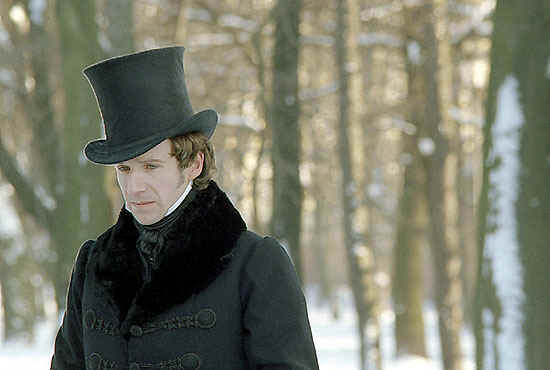Evgenij Onegin Filjm 1999
%2C445%2C291%2C400%2C400%2Carial%2C12%2C4%2C0%2C0%2C5_SCLZZZZZZZ_.jpg)
May 20, 1999 - May 20th 1999. But later this month, the Fiennes film, “Onegin” premieres in St Petersburg as part of the festivities marking the bicentenary of Pushkin's birth. Vladimir Nabokov, who himself translated “Eugene Onegin”,.
Onegin UK/USA 1998 Reviewed by Julian Graffy Synopsis Our synopses give away the plot in full, including surprise twists. The early nineteenth century. Bored St Petersburg dandy Evgeny Onegin inherits his uncle's estate and decamps to the countryside. There he meets a neighbouring landowner, the young poet Vladimir Lensky, and through him the Larin family: widowed mother and daughters Tatyana and Olga. Early modern english grammar.
Naive Lensky is engaged to flighty Olga but Tatyana, who is deep, is drawn to Onegin and writes him a declaration of love. At Tatyana's name-day party Onegin rejects her and flirts with Olga, which infuriates Lensky. They quarrel and Lensky challenges him to a duel. Lensky misses and Onegin shoots his opponent dead. A horrified Tatyana comes to visit him but he has left. Tatyana's mother introduces her into society and she marries a prince. Six years later, Onegin returns from his wanderings and is captivated by Tatyana's beauty and distinction.
He now writes her a passionate letter. Though she still loves him she remains true to her husband. Review Onegin opens with a sequence of startling beauty of a horse-drawn carriage crossing a vast expanse of snow. It is perhaps the major distinction of first-feature director Martha Fiennes' film to have made the settings of this story - the melancholy birch groves; the country estates with their contrasting interiors (the Larins' house bright and lived in, Onegin's romantically bereft); the splendour of imperial St Petersburg; a scene of people skating on a frozen river - so consistently enthralling, a triumph of cinematography, lighting and production design. Fiennes wears her background in commercials and music videos lightly - Onegin is much more visually restrained than Mumu, the version of the Turgenev story directed last year by the Russian commercials director Yuri Grymov.
This film is also uniformly well acted, with Liv Tyler compelling as the brooding Tatyana, her still demeanour somehow suggestive of the dark passions swirling beneath the surface. Lena Headey is equally persuasive as the shallow, impetuous Olga, so physically like her sister and so emotionally different.

There is a hilarious turn from Simon McBurney as the girls' oleaginous French tutor, and a memorable vignette from Irene Worth as the society grande dame Princess Alina. Executive producer Ralph Fiennes in the title role and Toby Stephens as Lensky also give thoughtful performances but both, alas, are about ten years too old for the parts they play. This renders Onegin precociously racked and seedy at the start, though it makes Fiennes persuasive in the (over-elaborated) concluding episodes. Lensky, however, is 18 in Pushkin's original and having him played by a noticeably older actor makes all his poetic petulance and hypersensitivity risible and exasperating without the saving grace of extreme youth. It also draws attention to the conventionality and predictability of the plot. Martha Fiennes has spoken of her desire to keep as close as possible to the original story of Eugene Onegin, but as she (and every Russian schoolchild) knows, to concentrate on the plot is to risk banality, removing precisely what makes this verse-novel unique: the extraordinarily vivacious authorial commentary and the famous ironic and subversive digressions through which Pushkin paints a compendious picture of a society and an age. This itself begs the question - who is this new Onegin for?
The film got its world premiere in Moscow in June as a central part of the lavish celebration of the bicentenary of Pushkin's birth. It provoked great and respectful interest, partly because the Russian film commissioned to mark the anniversary, Aleksandr Proshkin's Russian Riot, an epic version of Pushkin's story 'The Captain's Daughter', was not completed in time, and partly because the Russians, whose cinematic history is littered with Pushkin adaptations, have never filmed Eugene Onegin (though there is a film version of Tchaikovsky's opera known as Ievgeny Onegin starring Galina Vishnevskaya, made in 1958). So maybe the film's ideal audience is in Russia. But for Russians an Onegin without the familiar lines of poetry is not Onegin, and the various minor inaccuracies, such as a waltz danced to an orchestration of a famous Russo-Japanese War song, are inescapable and unsettling.